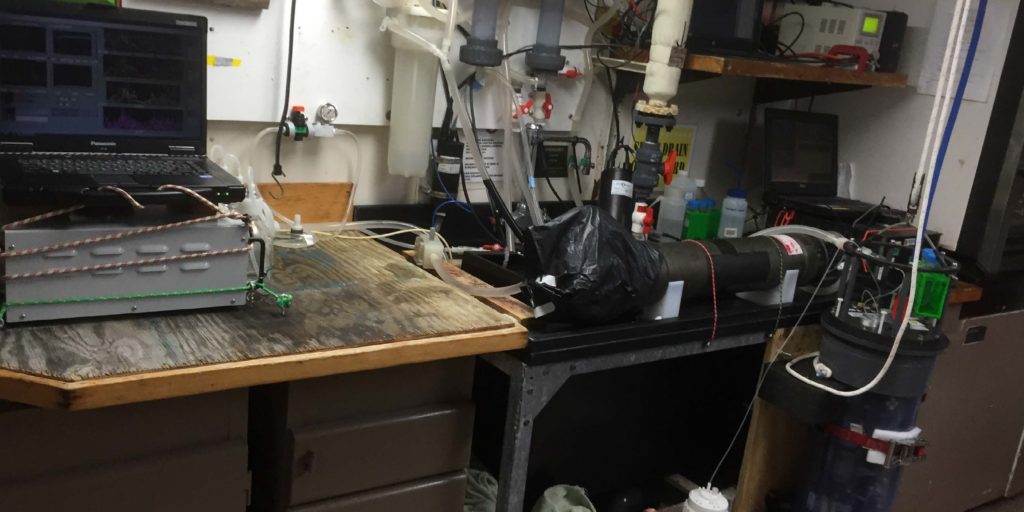Understanding the ocean and its processes requires collection of physical, chemical, and biological data from all areas of the ocean over an extended time period. Some variables can be deduced from satellite-based sensors, but satellites can only observe the ocean surface and a little below the surface, and require in-situ data to validate their products. Understanding deeper layers of the ocean requires sampling from ships and both stationary and autonomous platforms. Sampling from these platforms has increased over the past several decades over repeated routes and in fixed locations. The longest series of data are for physical variables like temperature. Some chemical variables, such as oxygen, are now measured regularly by ships and fixed moorings. Instruments to measure biological variables, like the number and identity of single-celled organisms in the ocean and how fast they grow, have taken more time to develop. This working group will help incorporate biological measuring technologies on programs that already involve ships taking physical and chemical measurements on regular routes and unattended sensing platforms. Adding biological measurements to these programs will greatly increase our understanding of the ocean and increase the return on the investment of ships and autonomous platforms that are already deployed.
- Chair(s)
- Emmanuel Boss (USA) and Anya Waite (Canada)
- Other Full Members
- Silvia Acinas (Spain), Ilana Berman-Frank (Israel), Marcela Cornejo (Chile), Katja Fennel (Canada), Heidi Sosik (USA), Sandy Thomalla (South Africa), Julia Uitz (France), and Hidekatsu Yamazaki (Japan)
- Associate Members
- Sonia Batten (Canada and PICES), Jørgen Berge (Norway), Herve Claustre (France), Gérald Grégori (France), Johannes Karstensen (Germany), Frank Muller-Karger (USA), Anthony Richardson (Australia), Bernadette Sloyan (Australia), and Rik Wanninkhof (USA)
- Reporter
- Enrique Montes
- Terms of Reference
General:
To identify best practices (technologies and sampling protocols) and technical feasibility to incorporate plankton measurements into global ocean observing platforms (initially GO-SHIP and for expansion into the mooring array of OceanSITES).
Specific:
- Identify current technologies (sensors as well as water sample analysis) that can be integrated into existing observing infrastructure to provide input and guide studies of plankton for marine ecosystem and biogeochemistry studies.
- Provide the necessary details associated with every technology/measurement proposed (e.g., power, cost, and human effort).
- Document potential applications, including science case studies and lists of publications, and document measurement protocols. Develop adequate protocols when these are not available.
- Identify synergies with specific measurements done from other observing programs (e.g., BGC-Argo, space-based measurements, Continuous Plankton Recorder surveys) to provide cross-calibration and a better representation of the 4-D distribution of the parameter measured.
- Identify technological limitations and/or gaps, and identify areas of priority investments to develop and implement the required observation technologies and tools for specific needs.
- Increase awareness of the availability of biological oceanographic datasets internationally and identify barriers to their access and use, particularly in developing nations.
- Approved
- September 2017
- Financial Sponsors
- SCOR, NSF, PICES
- Meetings
10 February 2018, Portland, Oregon, USA
7-9 November 2018 in Villefranche-sur-Mer, France
15 September 2019 in Honolulu, Hawaii, USA
February 2022 – online
- Publications
Boss, E., A. Waite, F. Muller-Karger, H. Yamazaki, R. Wanninkhof, J. Uitz, S. Thomalla, H. Sosik, B. Sloyan, A. Richardson, P. Miloslavich, J. Karstensen, G. Grégori, K. Fennel, H. Claustre, M. Cornejo, I. Berman-Frank, S. Batten, and S. Acinas. 2018. Beyond Chlorophyll Fluorescence: The time is right to expand biological measurements in ocean observing programs. Limnology and Oceanography Bulletin 27(3):89-90.
Lombard, F., E. Boss, A.M. Waite, M. Vogt, J. Uitz, L. Stemmann, H.M. Sosik, J. Schulz, J.-B. Romagnan, M. Picheral, J. Pearlman, M.D. Ohman, B. Niehoff, K.O. Möller, P. Miloslavich, A. Lara-Lopez, R. Kudela, R.M. Lopes, R. Kiko, L. Karp-Boss, J.S. Jaffe, M.H. Iversen, J.-O. Irisson, K. Fennel, H. Hauss, L. Guidi, G. Gorsky, S.L.C. Giering, P. Gaube, S. Gallager, G. Dubelaar, R.K. Cowen, F. Carlotti, C. Briseño-Aven, L. Berline, K. Benoit-Bird,, N. Bax, S. Batten, S.D. Ayata, L.F. Artigas, and W. Appeltans. 2019 Globally consistent quantitative observations of planktonic ecosystems. Front. Mar. Sci. 6:196. doi: 10.3389/fmars.2019.00196
- Boss, E., Waite, A. M., Uitz, J., Acinas, S. G., Sosik, H. M., Fennel, K., Berman-Frank, I., Cornejo, M., Thomalla, S., Yamazaki, H., Batten, S., Berg, J., Claustre, H., Grégori, G., Karstensen, J., Muller-Karger, F., Richardson, A., Sloyan, B., Wanninkhof, R., … Karp-Boss, L. (2020). Recommendations for plankton measurements on the GO-SHIP program with relevance to other sea-going expeditions. SCOR Working Group 154 GO-SHIP Report. Scientific Committee on Oceanic Research (SCOR). https://doi.org/10.25607/OBP-718
- Boss, E., Waite, A. M., Karstensen, J., Trull, T., Muller-Karger, F., Sosik, H. M., et al. (2022). Recommendations for Plankton Measurements on OceanSITES Moorings With Relevance to Other Observing Sites. Front. Mar. Sci. 9, 929436. doi: 10.3389/fmars.2022.929436.
